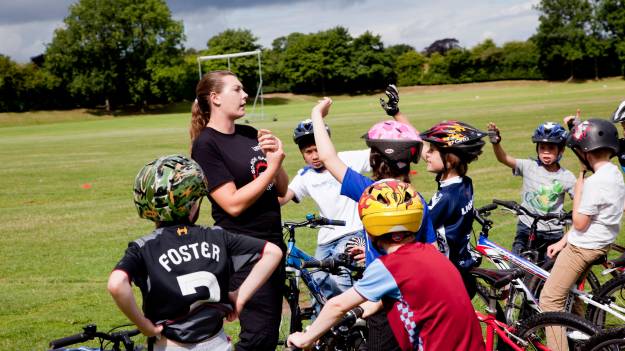Developing Your Coaching Philosophy
February 2009
In this months' CPD article we are introducing the concept of developing a personal coaching philosophy. A much underutilised concept, coaches rarely take the time to stop and fully consider what their own guiding principles to coaching are and how these will provide the underpinning foundations for their coaching practices.
The development of a coaching philosophy will be shaped by a multitude of factors and experiences will be personal to each coach, with coaches required to reflect on current practices and personal values. Ultimately whether a coaching philosophy is pinned to the fridge door or is stored as a mental note, it can be the single most important influence on how you work and crucially develop as a coach.
Why Coach? All sorts of people from a variety of backgrounds take up coaching for many different reasons. Knowing why you want to coach will help you to appreciate the different roles and responsibilities of a coach. It will also encourage you to reflect on your own attitudes, beliefs and motives within your coaching practice. This will help you to establish your own coaching philosophy on what you feel is important in coaching.
All sorts of people from a variety of backgrounds take up coaching for many different reasons. Knowing why you want to coach will help you to appreciate the different roles and responsibilities of a coach. It will also encourage you to reflect on your own attitudes, beliefs and motives within your coaching practice. This will help you to establish your own coaching philosophy on what you feel is important in coaching.
It is useful to reflect on this at times, as it can help you to make the right decisions. You may however find, that as you gather more experience of coaching your beliefs change. If this is the case, you will need to modify your philosophy accordingly.
When establishing your coaching philosophy you should also consider your motives for becoming a coach. For example, why do you want to get into coaching? For yourself or for others, or a combination of the two? Are you more interested in the long-term development of riders or short-term success? Is your burning ambition to coach a team to win medals at the Olympic Games or simply to help riders improve their skill levels?
Remember that your riders may not necessarily share the same motives as you. For instance, just because you consider some riders to be good enough to join the club team does not necessarily mean that they will want to. Their motives for taking part may simply be to get fit or have fun.
Whatever your reason for taking up coaching, you should always adopt a rider-centred approach. This means acting in the interests of your riders, not your own. If your only reason for becoming a coach is personal satisfaction and gain, you are unlikely to be effective and will soon become disappointed and frustrated.
How Should I Coach?
There are many expectations of you as a coach. One of these is that you will behave safely, responsibly, ethically and equitably. The way in which you behave will reflect your general attitude to coaching and, in the modern coaching environment, there is a need to ensure that you conduct yourself in line with acceptable good practice. This should be consistent with the principles of the British Cycling Code of Conduct.
There is not necessarily one correct way to coach. There are many different ways in which safe, responsible and ethical coaching can be achieved. To be an effective coach you need to be able to draw on an appropriate set of behaviours and act according to the context in which you are operating. Your coaching should always put the riders first, ie it should be rider-centred. This means empowering riders by involving them in making decisions regarding their development and actively encouraging them to take part in their own learning. It requires you to provide leadership, offer guidance, share decision-making and generally guide riders towards selecting and achieving their personal goals.
The way you coach will be influenced by a number of factors, including the following:
- Your coaching motives - The reasons why you take up coaching will undoubtedly affect how you coach. For example, if you wish to see young people develop socially and learn new skills, you will adopt a supportive, educational approach to coaching and place an emphasis on personal development rather than competitive success.
- The riders - If you adopt a rider-centred approach, as is recommended, you should adapt your coaching style to meet the specific needs of your riders.
- The situation - There are some situations in which a particular style of coaching is more appropriate than another. In certain contexts for example, where safety is an important issue, it might be more appropriate to adopt an autocratic and instructional approach to coaching, in order to maintain control and ensure that accidents do not happen and riders behave in an appropriate manner.
- Your personality - Coaches are human beings and, therefore, have individual personalities. Some coaches maybe extroverted, outgoing and lively in their approach to coaching, while others may be more introverted and go about their coaching in a quiet, calm manner. In truth, personality does not matter, provided that appropriate actions and behaviours are maintained, which relate to the situation.
- Your knowledge - The more knowledgeable you are as a coach, the more options you will have available to you to plan and deliver effective sessions. Knowledge will also help you to feel confident and create a positive environment for your riders. A coach lacking in knowledge may come across as low in confidence and may be perceived as lacking skills or the ability of knowing how to deal with certain situations.
As the above illustrates, the context in which a coach operates exists as a result of a number of issues and principles. As a coach, you must seek to identify your own answers to the questions associated with coaching, and create your own set of well thought-out values and strategies to apply during your coaching sessions. These are the backbone of your coaching philosophy.
Coaching Philosophy It is important for every coach to develop a personal coaching philosophy. Your coaching is strongly influenced by your coaching philosophy, which is what you feel is important in coaching. It is a set of guiding principles that reflects your personal beliefs, values, motives for coaching and your choice of how you will conduct yourself as a coach. It may provide answers for difficult situations in the future, will reflect your interpretation of what constitutes good coaching practice, and is based on your thoughts and actions regarding issues such as:
It is important for every coach to develop a personal coaching philosophy. Your coaching is strongly influenced by your coaching philosophy, which is what you feel is important in coaching. It is a set of guiding principles that reflects your personal beliefs, values, motives for coaching and your choice of how you will conduct yourself as a coach. It may provide answers for difficult situations in the future, will reflect your interpretation of what constitutes good coaching practice, and is based on your thoughts and actions regarding issues such as:
- your role in relation to riders and others associated with your sessions, such as parents, other coaches, officials and administrators
- the extent to which your riders are responsible for their own behaviour and development, setting goals and contributing to the design of the programme
- the relative importance of the outcome of competition in relation to the long-term development and well-being of riders
- the importance of adhering to the rules, the meaning of fair play and the use of banned substances to enhance performance
- the intensity of training and competition for children and young people
- the need for a single-minded commitment or the importance of balance in the riders' lives.
Reflecting on what coaching means to you, and why you do it, is important because this information will give valuable insights into your coaching - how you coach now and how you would like to coach in the future. You need to focus on your coaching goals and philosophy, and examine your behaviour to determine what sort of coach you want to become. You may also want to check whether your coaching reflects your philosophy. Are your aims and values apparent in the way you coach?
You may not yet have thought about your philosophy and beliefs (or values) - usually you develop them as you extend your knowledge, interact with people and gain wide-ranging experiences through life. Your philosophy and beliefs will affect your decisions and subsequent effectiveness. Therefore, examining them is important.
Your philosophy may be verbal or, preferably, written and should reflect your own coaching goals, morals and beliefs. Examples of common elements of a coaching philosophy include to:
- have mutual respect between rider and coach
- be open and honest
- be approachable
- be accountable
- educate the rider to become independent
- have mutual commitment for the rider to achieve individual potential
- coach in a simple, structured way that is underpinned by current exercise science be clear and critical in assessment
- seek feedback from riders
- be reflective about, and committed to, ongoing learning and development
- be equitable
- work within the rules of the sport.
Underpinning all of your roles as a coach are the British Cycling Code of Conduct, the British Cycling Health and Safety Guidelines for Coaching Cycling and any contract into which you and your riders have entered.
The above article is based on information developed for the new Level 3 coaching qualifications, but is equally as applicable to all coaches, no matter what level they may be coaching at.
To find out more information on the new Level 3 coaching qualifications please follow the links below or contact us at Coaching and Education on 01612472060
Level 3 Certificate in Coaching Road and Time Trial Cycling
Level 3 Certificate in Coaching Track Cycling









